Student Blog
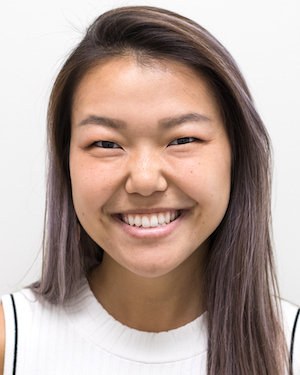
The 2020 (course) Elections ⟩
January 23, 2020, by Kaho
Welcome back everyone, and happy 2020! I hope you all had a restful and restoring winter break. I flew home to Japan for the full four weeks and I got to travel all over with my family. I spent some time in northern Japan, snowboarding and skiing in the snowy mountains, as well as in Japan’s southernmost tropical island, scuba diving and sightseeing! I feel like I experienced all four seasons in four weeks. Now I’m back in school, my jetlag has passed, and I am officially back on the grind. I’m beginning my last semester of classes for the master’s program, which means (as many of you may know) . . . electives! The Chan Division offers a wide variety of elective courses to choose from and these courses prepare you in specialty areas that you may want to pursue once you get out into the real world. You also have the option to take courses in other USC schools, such as the school of business, public policy, arts and sciences, etc. I’ll share with you today the courses that I’m taking, but past ambassadors have also written blog posts about what classes they took so be sure to check those out if you’re interested in learning more about what goes on in each class.
- OT 561: Occupation Therapy in Acute Care
For anyone interested in working in hospitals eventually or anyone interested in learning the more medical side of OT, this class is fantastic. This course goes over various systems of the human body and the implications for therapy when a person has issues in any of them. You get a sneak peek into the exciting and fast-paced life of an acute care OT and even get to observe it first hand through the clinical hands-on portion of the class! Similar to Level 1 fieldwork, you get paired with a clinical instructor at Keck Hospital and you get to follow them for several sessions throughout the semester. We learn the names of common illnesses and their treatments, medical devices, and so on. Even though I’ve only sat through two lectures for this course so far, I already know that it’s going to be one of my favorites. - OT 578: Therapeutic Communication for the Healthcare Practitioner
This course can be beneficial for anyone, regardless of what setting you’re interested in going into. You honestly don’t even have to be pursuing OT to benefit from this course. It trains you in a skill called Motivational Interviewing, which is a therapeutic communication style that can be used to facilitate change in clients. It also covers mindfulness practices, which can be a tool for myself as well in my own daily life. I know it’s going to make me a more effective communicator and a better listener for my friends, family, and clients so I’m really excited to learn more and practice. - OT 579: Occupation-Based Adult Neurorehabilitation
During my fieldwork experiences, I had the opportunity to work with several patients with spinal cord injuries and strokes. It can be devastating to lose function in your arms and legs and as you can imagine, OT can play a huge role in these people’s recoveries. This course teaches you and lets you practice various assessments that you may use in a neurorehab setting. We learn to analyze movement and consider how neurological impairments interfere with people’s ability to engage in meaningful occupations. It’s hands-on; students practice on each other while the professor demonstrates, and it’s all really interesting. As someone that wants to work in a variety of fields within the adult population, preferably in a hospital, this course supplies me with knowledge and skills that I know will come in handy during my career.
There are so many other classes that I was interested in taking, but time and the allowed number of units forced me to pick and choose. I’m enjoying all of my classes so far, so I know it’s going to be a fast, exciting semester. And then I graduate! 😮 Have a great semester, everyone.
⋯
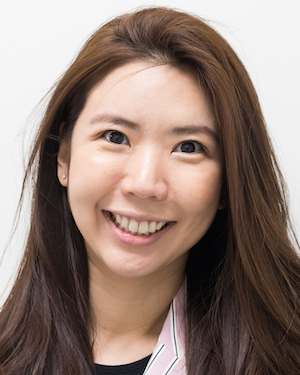
New Year, New Challenges, But We Got This! ⟩
January 22, 2020, by Catherine
This is my first blog post of 2020 and it feels great to be back. The holidays are a magical time of the year, but my passion for occupational science and occupational therapy puts a little more pep in my step when I walk into CHP. And while we are talking about the subject of the new year, we cannot exclude the popular tradition of setting goals, resolutions for our self! I had an interesting discussion recently during my OT 649 course about health behavior change models and in particular, Social Cognitive Theory (SCT), that might provide you some insight if you feel that you are having trouble sticking to any resolutions of your own.
In short, SCT states that people are in charge of their lives and environment and can be motivated to overcome challenges through a positive sense of self efficacy. This theory can inform health promoting behavior change interventions in occupational therapy, and other health professions. In other words, we are taking about the just right challenge.
One of the requirements of during the first semester of the OTD program is to pass the NBCOT exam and become a certified occupational therapist. Trying to juggle my residency hours in preparation for the 2019 Occupational Science Symposium, attending class, and studying for the boards required a lot of balancing priorities and self-control. I did not think that I had the mental and physical capacity to achieve this goal. What got me through this time was the support from faculty, colleagues, and the overall sense of community I have always been provided here at Chan. This support allowed me to maintain a level of self-efficacy that motivated me to overcome my doubts and proactively push myself to close the gap of what I thought I could not do, and what I wanted to do. And according the SCT, self-efficacy is key.
Experiencing and overcoming the challenges of the Fall semester has enabled me to increase my sense of self-efficacy and will motivate me to challenge myself in this semester, and the next, until I achieve my long-term goal to obtain my OTD degree! So if you feel like you might not be able to keep up with your news year resolutions, find yourself a cheerleader, adjust the goal, tackle it in parts, instead of going to the gym 5 days a week, start with today. And then next time, your mind and body will know, if you did it once, you can do it again, and you will be better positioned to go twice a week, and then three times a week, until you ultimately reach your goal.
⋯
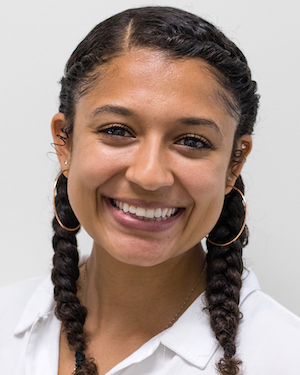
Electives and Field Trips ⟩
January 21, 2020, by Kat
Second semester of your second year in the OT program at USC is the freedom semester! This is when you are tasked with a difficult yet rewarding, complicated yet exciting, cut throat task of choosing . . . drumroll pleaseeee . . . your own electives!! Having the freedom to choose electives is kind of a double edged sword. There are so many great electives to choose from. There’s early intervention, acute care, motor rehab, to name a few. You can even opt to take elective courses on the main campus in other departments. Let’s say you are interested in running your own clinic one day, so maybe you take a business course. Second semester of your second year is meant for students to take lead in their learning and pursue topics and subjects that align with their interests and their future careers. If you are like me though, every class sounds interesting, which is why making a decision on what to take can be so difficult. There are still a few courses that are required, however, you get to choose how to fill up the rest of your credits.
Anywaysss . . . one of the classes I am taking right now is OT 571 Assistive Technology with Dr. Colin Lenington. Today in class we had the opportunity to go to Mobility Evaluation Program in the city of Bell where we met with individuals who specialize in helping people with disabilities be independent with their driving. During our field trip (Field trips in grad school? What??), my class and I were able to learn about some of the cool adaptive equipment that can be used to help people with varying disabilities to drive. If you think about it, driving is such an integral part of our everyday occupations, especially here in LA. It was such an eye opening experience for me. I had no idea this type of equipment was out there. As a class, we even had the opportunity to see the assistive tech we learned about in use with 2 clients that were there to demonstrate their personalized equipment.
I am not sure the specific realm of OT I want to go into yet. But I do know that I was blown away by the impact that helping someone with a task that I take for granted, driving, can have on an individual who navigates through the world differently than I do. Long story short, I am excited to see what else I learn in OT 571 Assistive Technology, along with my other courses. Cheers to an exciting semester . . . and to hopefully figuring out what area of OT I want to go into.
Check out my class and some assistive tech!
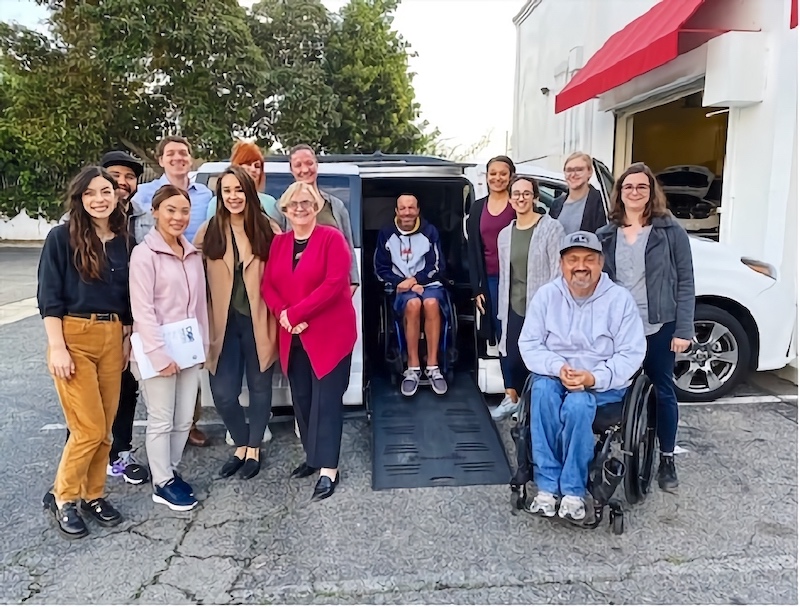
My Assistive Technology class with 2 clients that shared their experience with us. We are so grateful for their willingness to share with us! (Photo shared with permission from all individuals depicted)
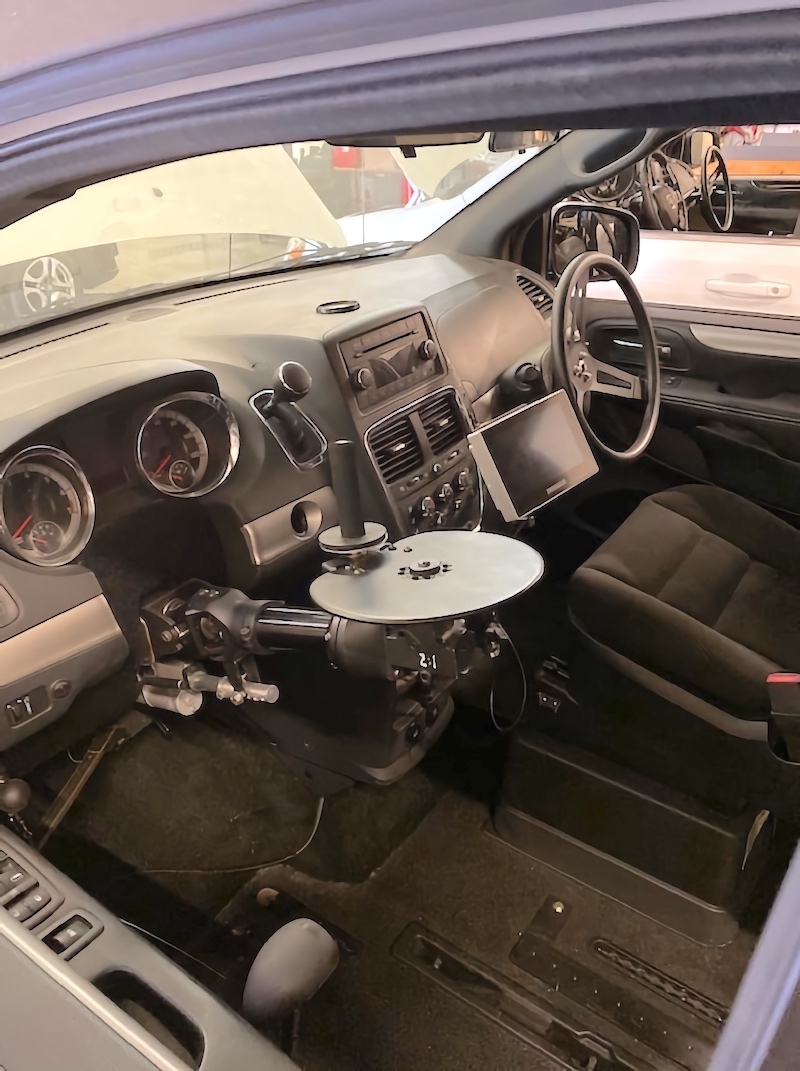
Here is an example of an adapted steering wheel a client may need to allow them to drive in a horizontal plane versus the “typical” vertical plane. This type of steering wheel is similar to what is seen on school buses. The steering is situated over the client’s lap as opposed to being mounted on the dashboard. On the floor of the car, you can also see where a wheelchair can be secured in place instead of the original car seat.
⋯
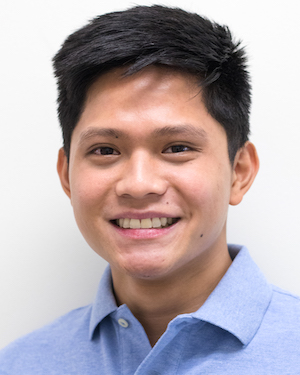
Winter Break with the cohort! ⟩
January 17, 2020, by Japeth
After the stressful finals week, some of my classmates organized an out-of-state trip to Utah to visit two national parks: Zion National Park and Bryce Canyon National Park. Driving to Utah takes about 8 to 9 hours, depending on the traffic, speed, and of course the rest breaks! So, we decided to do a stop over in Las Vegas and to eat lunch there, since Las Vegas is also known for its sumptuous buffets everywhere. By the way, driving from LA to Vegas takes about 4 to 5 hours.
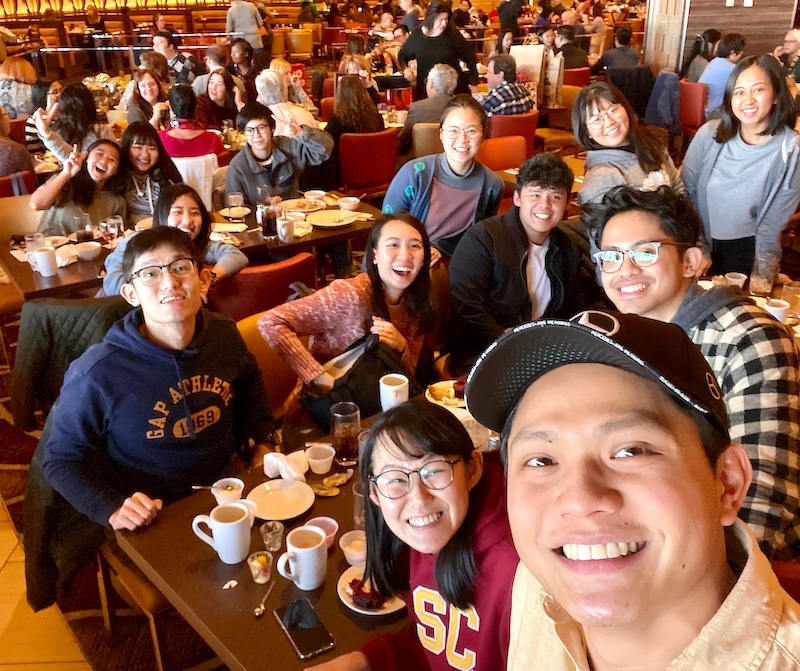
A groufie after eating so much!
After having lunch, we all decided to go back on the road and head to Utah. From Las Vegas to Utah, it took us almost five hours to get there. On the way to Utah from Vegas, we passed by Arizona — and the view is very relaxing! I am sharing some snaps of the view but my apologies if they are unclear, since the car was moving when I took them.

We didn’t mind the long drive from Las Vegas to Utah since the view while passing by Arizona was really beautiful.

Naturesque indeed!
We rented an Airbnb and surprisingly, the house was big enough to accommodate us all. One thing that made the house extra special was the hot tub that was available for use!
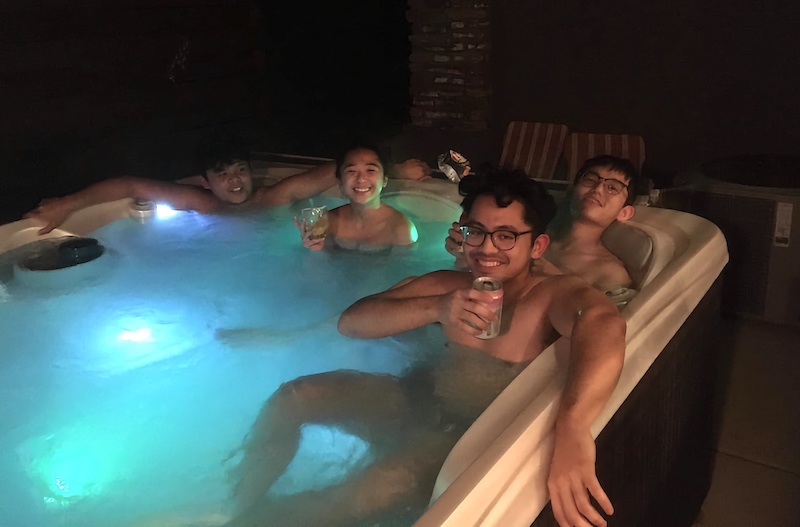
My friends living the life! What better way to enjoy the hot tub than by pairing the experience with some juice and chips?
First day: Off to Zion National Park
In this national park, you can choose as many trails a you want to enjoy; but given our time shortage, we chose one of the easiest but beautiful trails there was: The Watchman Trail. This trail typically takes about less than 3 hours going back and forth. However, it took us more than four hours because we enjoyed so much on taking pictures almost in every good spot we find along the way.
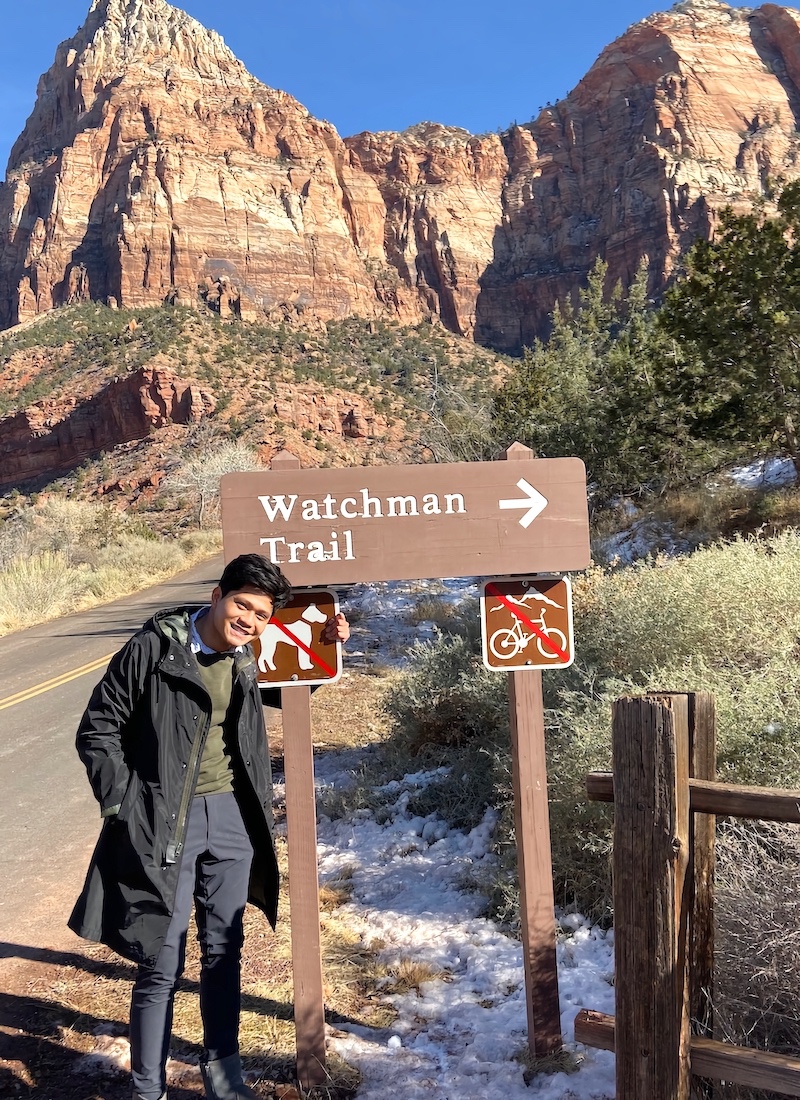
This is just my happy face after we finished trailing!
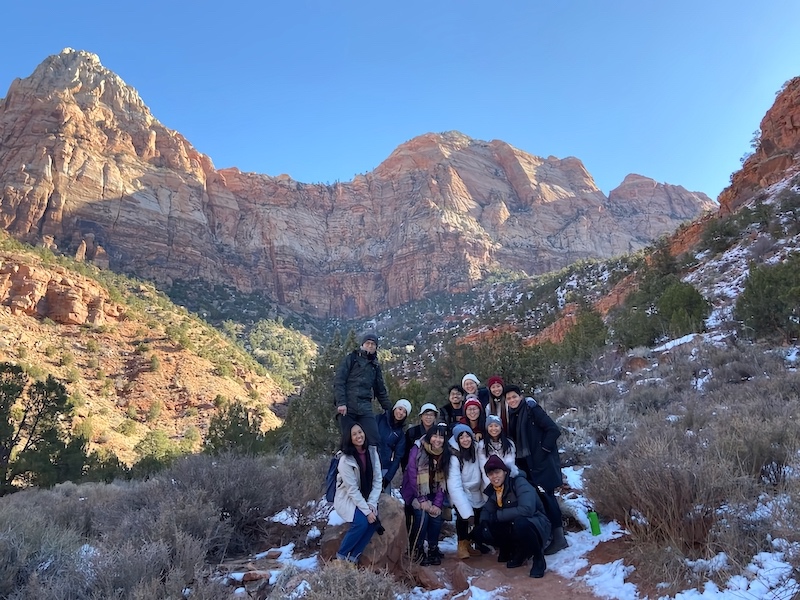
This is one of the group photos that we took while trailing. We don’t look tired here . . . yet!
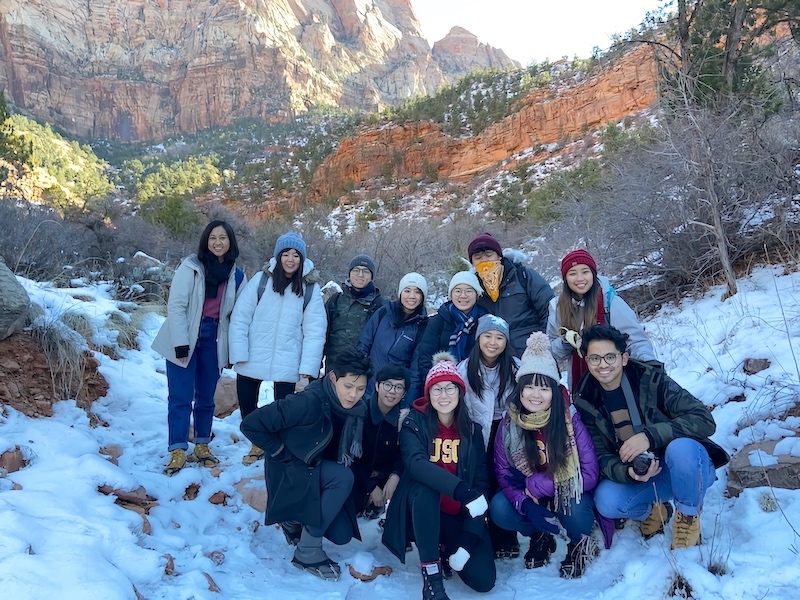
Another group photo! This time, it was colder since we encountered more snow while trailing. We had to wear our snow chains because there were some areas that were covered with ice, and it is so easy to slip when you don’t have the chains on. The cold bothered me, as seen on the picture I can’t even concentrate and look at the camera. LOL
When we finally reached the top, of course, we took more photos! We stayed on top for 30 minutes, enjoying the view while eating our snacks. The snow covering the mountains made the view extra beautiful. The sun being extra sunny that day, helped so much in braving the cold weather.
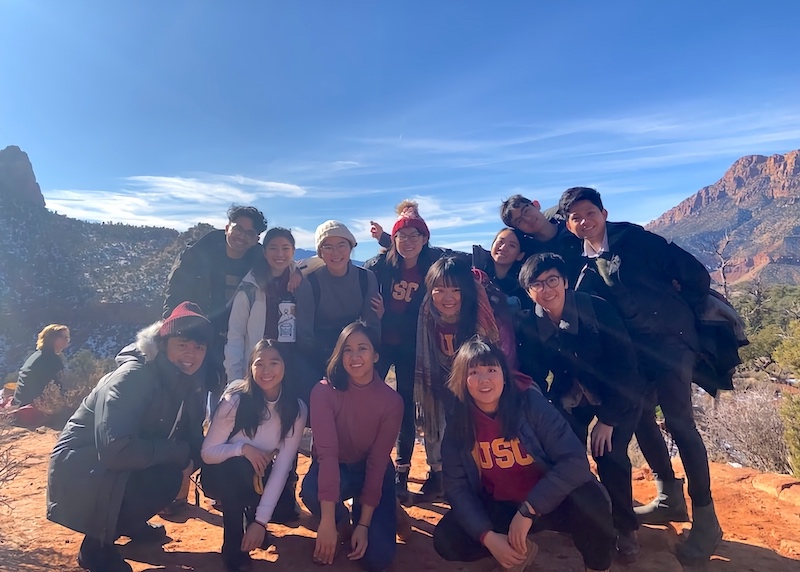
We are finally at the top! Tip: according to the locals, the best time to visit is winter since not a lot of people visit because of the very cold weather.
To end the day, we looked for a local coffee shop to warm ourselves up; and even the coffee shop did not fail to surprise us! The place was so beautiful, and they have a balcony area where you can sit outside, have your coffee, while looking at the lake and mountains.
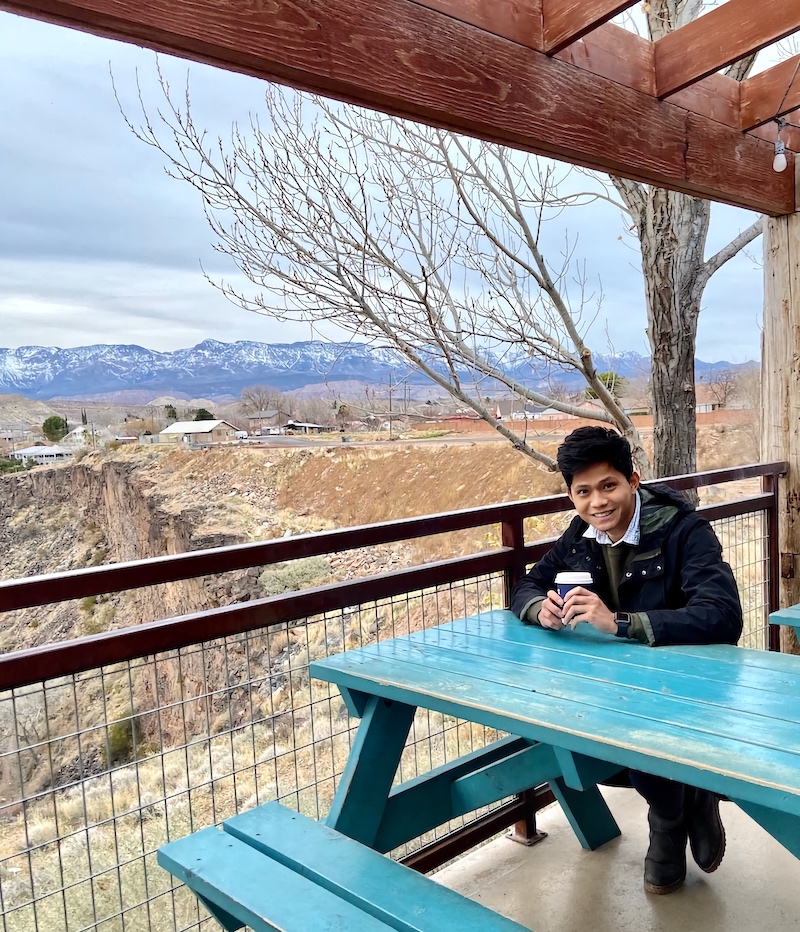
Good view + good coffee = good mood!
Day 2: Bryce Canyon National Park – Sunrise Trail
This trail was amazingly beautiful as well! We started from the top and we trailed down. Just when I thought that in order to see the beautiful view, we need to reach the top first, this trail proved me otherwise. Going down from the top made me appreciate the scenic view too! It goes to show that sometimes, we shouldn’t just focus on the beginning or the end; rather, we can also focus on the journey and enjoy every moment with the people we are with.
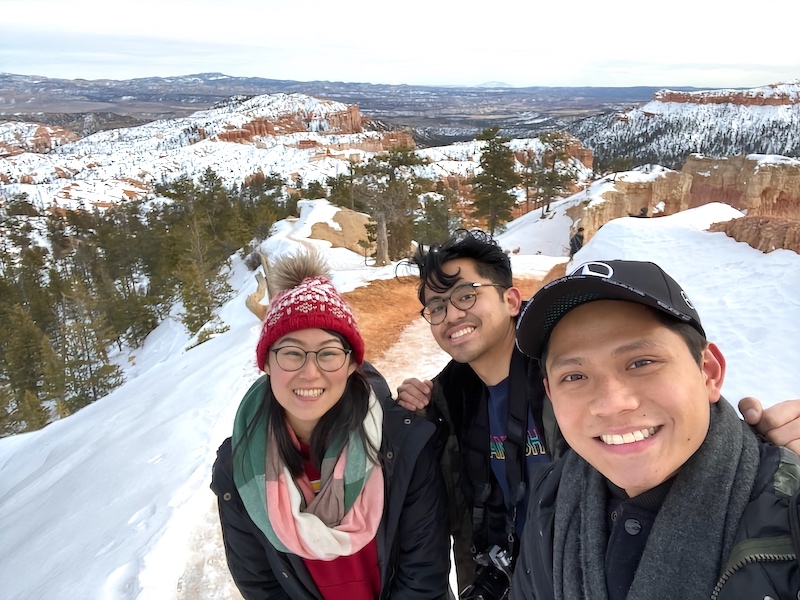
A groufie with my classmates Elijah and Maggie. Everyone went ahead of us at this point.
Here are photos of us before and after the hike!
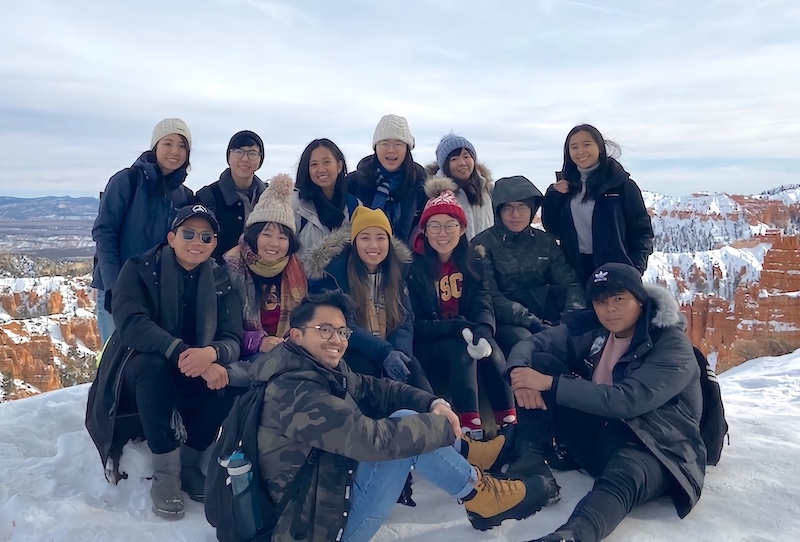
This is our group photo before we started trailing down. The amazing people made the view extra beautiful!
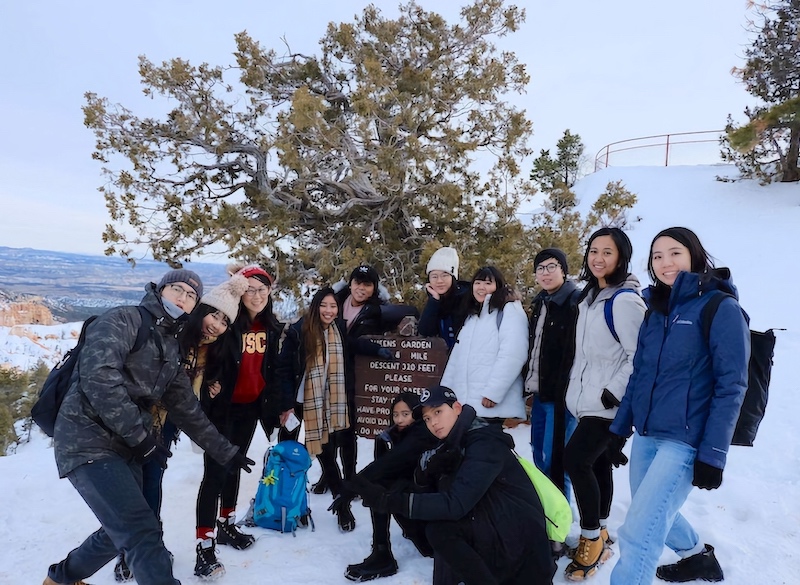
Mixed emotions after finishing the trail. LOL
From the visitor center near the starting point of the Sunrise Trail, we drove a few miles from there going to Sunset Point — another point at the national park where the sunset is really gorgeous.
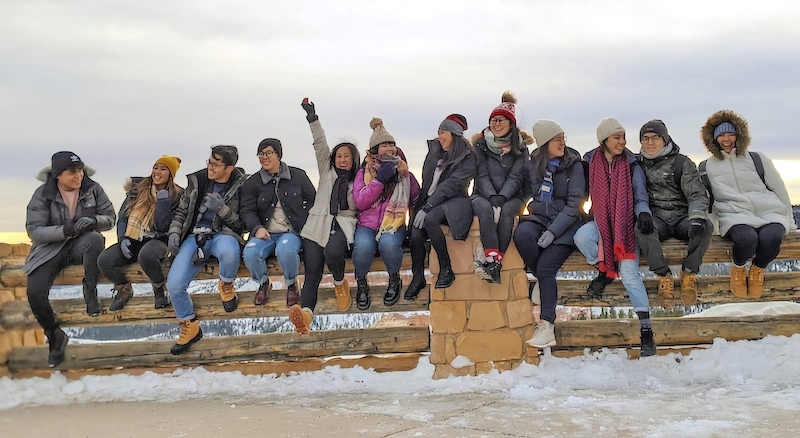
Although the sunset may not be clearly seen in this picture, I can still vividly see it in my memory. Everyone was just busy enjoying the view, and of course, each other’s company.
This trip will always have a special place in my heart and memory. Being with my classmates outside the classroom was a different kind of experience. It was a joy to be with them for several days and I certainly wish for more trips with them. Also in this trip, two other Trojan friends joined us: Nana Lin who is a Masters in Microbiology and Immunology student, and Eden Lin who is also doing her Masters in Computer Science.
Until our next adventure, Fight On!
⋯
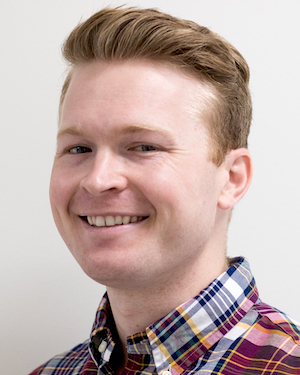
Winter in Los Angeles ⟩
January 16, 2020, by Kevin
“Winter in Los Angeles” . . . pretty much an oxymoron because it feels like summer here all year. So, how do winter enthusiasts such as myself get my fill of the cold seasons? It’s not easy, but here are some of my favorite winter activities to make this warm weather at least feel a little colder.
My first major strategy to get some winter vibes in my life is to change the decorations in my apartment. When I first moved here, I did not have many decorations, but after missing out on the seasons, I started changing my apartment decorations based on season I wanted my home to feel like. Right now, I am transitioning my fall decorations of pumpkins, spice-scented candles, reds, oranges, and browns to my winter decorations. The first thing I do when I get home to get in the winter mood is to light a pine scented candle, then I turn on the TV in the living room and play an ambient visual of a fireplace with crackling noises. While my apartment has a fireplace, I almost never use it because it just does not get cold enough, so the fake fireplace does wonders to give me the relaxing feel of a cozy fire. After setting the winter mood, I start busting out our winter décor including snowflake pillows, holiday lights, and pine-wreaths! It does not take much to create the feel of winter inside even though it’s still that perfect 65-70 degrees outside all year.
After my apartment has been transformed for winter, I start planning my winter themed activities. This includes blowing the dust of the board games for rainy days, making winter-themed crafts, and finding the best outdoor ice-skating location. Last, but certainly not least, I try to make a trip down to Disneyland because if there is any place that decorates for winter, Disney is sure to deliver.
With the changes to my decorations and leisure activities, “winter in Los Angeles” feels just as cozy and cold as I need!
⋯





